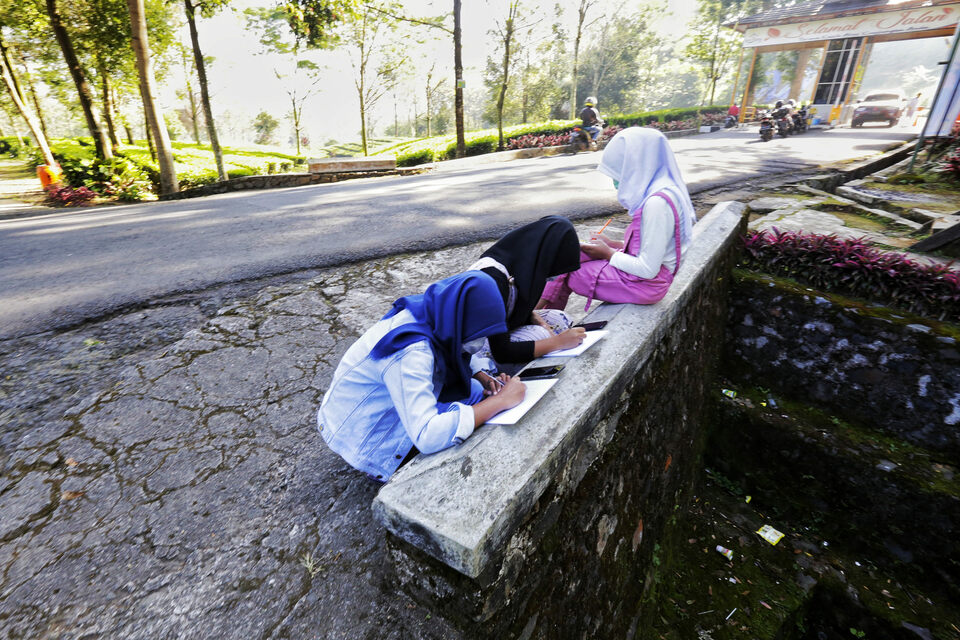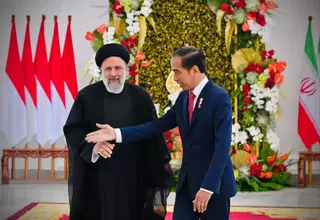Students and Teachers to Receive Internet Subsidy for Online Classes

Jakarta. Students and teachers will soon receive an internet subsidy for their online classes for the next four months, according to Communication and Information Technology Minister Johnny G. Plate.
School closures due to the coronavirus outbreak have exposed the gaping digital divide.
Conference calls can require a considerable amount of cellular data which low-income families may struggle to provide. Lack of reliable internet access still lingers in remote areas. Reports of criminal acts by parents stealing gadgets for their children's online classes are surfacing on the news.
According to Johnny, President Joko “Jokowi” Widodo has urged for more robust digital transformation in education and distance learning in particular. The government is also working on the telecommunication infrastructure to close the technology gap, including connecting 9,113 villages with 4G networks by 2022.
“However, pupils, lecturers, teachers, and university students do not only need infrastructure support, but also assistance in the downstream level such as signal, gadget and telecommunication devices needed for digital interaction,” Johnny said at a recent webinar aired by Beritasatu TV.
Previously, the government had allocated a whopping Rp 1.9 trillion (around $128.4 million) for cellular data subsidies provided by cellular operators. Unfortunately, the budget was unable to cover everyone.
“There are 44 million students, 8.2 million university students, 200,000 lecturers and millions of teachers. At least from September to December, we can provide the data plan subsidy,” Johnny said.
As of now, the government is calculating how much funds are needed for the subsidy. Once the adjustments in the spending plan (DIPA) are complete, both students and teachers can enjoy a cheap internet package.
"The Communication Ministry supports the Education and Culture Ministry to implement the state-funded data incentives for education," Johnny said.
Education and Culture Minister Nadiem Makarim had earlier lifted the limitation on the use of the school operational assistance fund, or commonly known as BOS, to support remote learning. Schools can use the BOS fund to purchase internet packages for both students and teachers.
Short-Handed
The government is currently focusing on strengthening the human capital to be more tech-savvy as part of their digital economy strategy in facing the so-called industry 4.0.
Indonesia is projected to require at least 113 million digital talents between 2030 and 2035, but the country is still 9 million people short. If Indonesia does not nurture enough digital talent within the next 15 years, it is likely that the country has to rely on foreign supply, Johnny said.
Because of this, Johnny encouraged all components -- including the Education Ministry, the Indonesian Teachers Association (PGRI) and regional governments -- to take a more active role to improve the national digital talent by both quantity and quality.
The Communication Ministry has also designed a roadmap which comprises infrastructure completion, regulations and the human capital spectrum.
"With this, the stimulus given by the Communication Ministry can be followed through comprehensively by other sectors to generate digital talent from Indonesia’s golden generation within the next 15 years,” Johnny said.
In comparison to other pandemic-ridden sectors, the information and telecommunication sector rose to 10.88 percent in Q2 from 9 percent in Q1. This shows that the sector has an interesting prospect and will continue to grow, he added.
POPULAR READS
KPK Identifies Sidoarjo Regent as Suspect in Corruption Probe
KPK has identified Ahmad Muhdlor Ali as a suspect in a corruption case involving the Sidoarjo Regional Tax Service AgencyEconomic Concerns Overshadow Security Worries for Indonesians in Iran
Indonesian citizens currently in Iran are more concerned about rising inflation than the security situation in the country.IDX Slides 2 Percent as Geopolitical Conflict Rattles Market Confidence
The IDX attributed the subdued performance of the index at the start of the week to the escalating geopolitical tensions in the Middle EastRupiah Declines Against Dollar Amid Geopolitical Unrest
The Indonesian rupiah depreciated against the US dollar in Tuesday's trading session, driven by escalating tensions between Iran and IsraelNasdem Vows to Honor the Constitutional Court Ruling on 2024 Presidential Election Dispute
Nasdem's Willy Aditya commits to respect the Constitutional Court's ruling on the 2024 presidential election dispute.Popular Tag
Most Popular






















